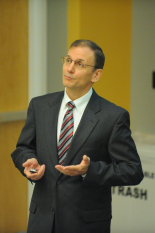
|
 |
Dr. Dzombak |
|
Dr. David A. Dzombak , the Sr. Professor of Environmental Engineering at Carnegie Mellon University, gave a lecture titled ?Geologic Sequestration of CO2: Evaluating and Monitoring Seal Rock Integrity.?
Environmental graduate student Marya Orf attended the lecture. ?It was interesting to hear the specifics about what the main concerns are,? Orf said. She added, ?I was surprised to see that such a small amount of seepage, even 1%, could affect their goal.?
Dzombak began the lecture by breaking down the basics. ?CO2 levels in the atmosphere contribute largely to the rising global temperatures,? Dzombak said. ?A large amount of CO2 comes from fossil fuel use?If we want to stabilize the amount of CO2 in the atmosphere, we need to stabilize the emissions rate.?
He listed some of the ways to reduce emissions, such as replacing coal with natural gas, using nuclear power, and CO2 capture and sequestration (CCS).
UMBC graduate student Piuly Paun said, ?I think sequestering CO2 is a relatively new concept. My general impression is that it?s a very risky technique.?
Environmental graduate student Natasha Andrade said, ?I think it?s ambitious, there is a lot of engineering that needs to be done for it to go anywhere.?
Dzombak acknowledged the risks, such as the fractures that can occur with directional drilling. However, he stated, ?There is no feasible way for the U.S. to achieve a 50 to 80% reduction in emissions of carbon dioxide by 2050 without carbon capture.?
October 4, 2010
|

